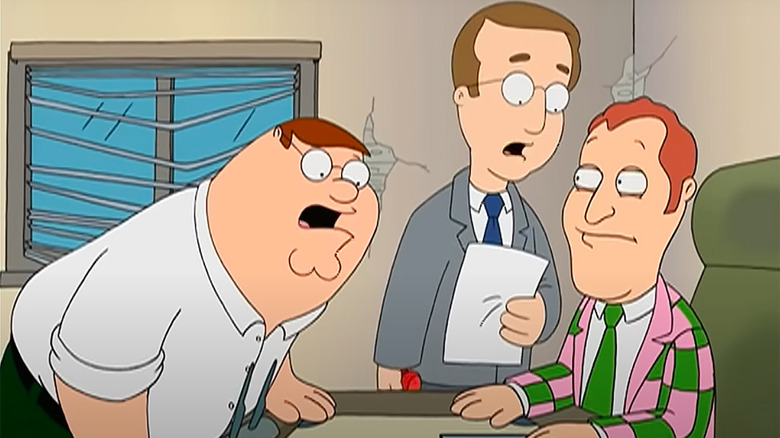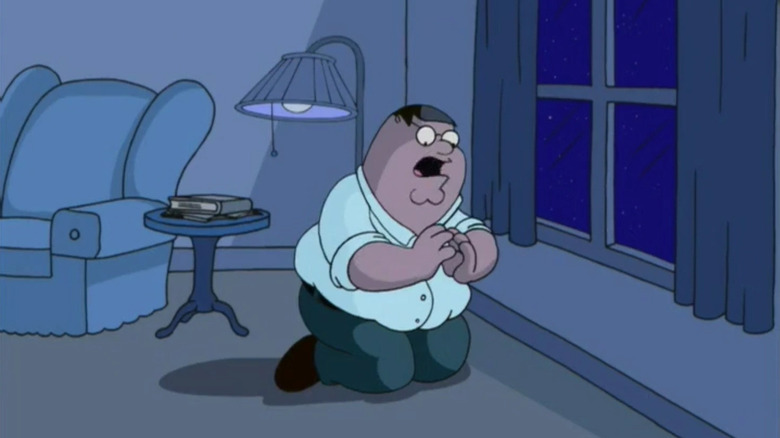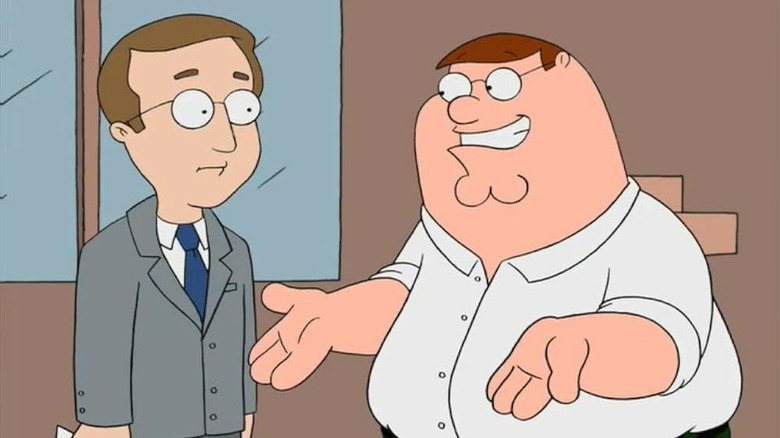Fox Faced Legal Backlash After A Family Guy Season 3 Parody Stirred Trouble
Despite being on network television, Seth MacFarlane's irreverent animated sitcom "Family Guy" can get away with a lot of edgy humor. With over 20 seasons under its belt, the show's reputation precedes it, and audiences are well-aware that the series is actively trying to push buttons through provocative satire and parody. However, during the show's original three-season run, before it got canceled and eventually resurrected thanks to a second wind from DVD sales, "Family Guy" didn't have the same power. That's why Fox initially refused to air one particular episode.
"When You Wish Upon a Weinstein" now sits firmly as part of the third season of "Family Guy," but it became an infamous installment after Fox axed the episode before it even aired. The episode in question finds dimwitted patriarch Peter Griffin (voiced by Seth MacFarlane) scammed by a man selling volcano insurance, something wholly unnecessary in Quahog, Rhode Island. After losing a bunch of money, Peter's friends Quagmire and Cleveland suggest hiring a lawyer with a Jewish name to help him with his money problems. The entire premise is based on the stereotype that Jewish people are better with money than anyone else. Lo and behold, a lawyer named Max Weinstein (voiced by Peter Reigert) suddenly finds his car broken down in front of the Griffin home, giving Peter exactly what he needs to get his money back.
Fox felt the episode could potentially be viewed as antisemitic, and they opted not to risk any backlash from audience members who didn't understand the intended humor behind Peter's stupidity. The episode would eventually get a special presentation on Adult Swim in 2003, before ultimately airing on Fox in 2004. As MacFarlane noted in a special intro to the episode's first airing, the story focused on "Peter Griffin's misconceptions of the Jewish community," reaffirming that this is satire depicting a Jewish stereotype but isn't intended to endorse that perspective.
However, that wasn't the end of the controversy surrounding "When You Wish Upon a Weinstein."
Pinoccho vs Peter Griffin
"When You Wish Upon a Weinstein" ended up being the subject of a lawsuit tied to Disney's classic animated adaptation of "Pinocchio" from 1940. But it wasn't the House of Mouse behind the lawsuit, and it had nothing to do with the episode's satire of Jewish stereotypes. Instead, three years after the episode aired, Bourne Music Publishers sued Fox and the creators/producers of "Family Guy" because they believed a parody of the iconic song "When You Wish Upon a Star" was nothing more than a "thinly veiled copy" of their original tune (via Wall Street Journal).
In "When You Wish Upon a Weinstein," Peter Griffin sings a song about wanting someone Jewish to help him get back the money he lost in the volcano insurance scam. The song is titled "I Need a Jew," but it's very clearly a spoof of "When You Wish Upon a Star," which is a no-brainer considering the title of the episode. Here's the song as it appears in the "Family Guy" episode:
In the lawsuit, the attorney for Bourne Music Publishers said, "If you listen to the structure of the lyrics, the song, the name of the episode and how (Peter's) singing out the window to the stars, there's no question they were using the song." Yes, that's true, and that's because "Family Guy" was intentionally parodying the famous song, which is why the lawsuit didn't amount to any real legal trouble a couple of years later when the case came to an end.
Fair use, baby!
As recounted in the Pillsbury Law legal Journal:
"In granting the defendants' motion for summary judgment and dismissing the complaint, the court held that the song 'I Need a Jew' was a parody of 'When You Wish Upon a Star' and exempt from liability under the fair use doctrine of the U.S. Copyright Act."
Basically, the lyrics were "strikingly different," and the amount of the song used by "Family Guy" writers and series composer Walter Murphy "was no more than was necessary to conjure up the original work in order to make the object of the criticism recognizable." Furthermore, it was determined that "the new song had no effect on the value of or potential market for the original song." Those three factors were enough to cover the parody under fair use and get the lawsuit dismissed in favor of "Family Guy." They didn't even need to wish upon a star.


